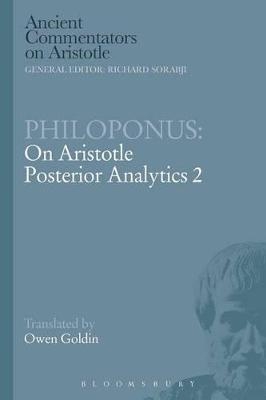
Philoponus: On Aristotle Posterior Analytics 2
Seiten
2014
Bloomsbury Academic (Verlag)
978-1-4725-5783-4 (ISBN)
Bloomsbury Academic (Verlag)
978-1-4725-5783-4 (ISBN)
Contains Aristotle's Philosophy of Science.
The Posterior Analytics contains Aristotle's philosophy of science. In Book 2, Aristotle asks how the scientist discovers what sort of loss of light constitutes lunar eclipse. The scientist has to discover that the moon's darkening is due to the earth's shadow. Once that defining explanation is known the scientist possesses the full scientific concept of lunar eclipse and can use it to explain other necessary features of the phenomenon. The present commentary, arguably ascribed to Philoponus incorrectly, offers some interpretations of Aristotle that are unfamiliar nowadays. For example, the scientific concept of a human is acquired from observing particular humans and repeatedly receiving impressions in the sense image or percept and later in the imagination. The impressions received are not only of particular distinctive characteristics, like paleness, but also of universal human characteristics, like rationality. Perception can thus in a sense apprehend universal qualities in the individual as well as particular ones. This volume contains an English translation of the commentary, accompanied by extensive commentary notes, an introduction and a bibliography.
The Posterior Analytics contains Aristotle's philosophy of science. In Book 2, Aristotle asks how the scientist discovers what sort of loss of light constitutes lunar eclipse. The scientist has to discover that the moon's darkening is due to the earth's shadow. Once that defining explanation is known the scientist possesses the full scientific concept of lunar eclipse and can use it to explain other necessary features of the phenomenon. The present commentary, arguably ascribed to Philoponus incorrectly, offers some interpretations of Aristotle that are unfamiliar nowadays. For example, the scientific concept of a human is acquired from observing particular humans and repeatedly receiving impressions in the sense image or percept and later in the imagination. The impressions received are not only of particular distinctive characteristics, like paleness, but also of universal human characteristics, like rationality. Perception can thus in a sense apprehend universal qualities in the individual as well as particular ones. This volume contains an English translation of the commentary, accompanied by extensive commentary notes, an introduction and a bibliography.
Owen Goldin is Associate Professor of Philosophy at Marquette University, Wisconsin, USA.
Preface
Introduction
Textual Emendations
TRANSLATION
Notes
Bibliography English-Greek
Glossary Greek-English Index
Index of Passages Cited
Subject
Index
| Erscheint lt. Verlag | 10.4.2014 |
|---|---|
| Reihe/Serie | Ancient Commentators on Aristotle |
| Übersetzer | Owen Goldin |
| Verlagsort | London |
| Sprache | englisch |
| Maße | 156 x 234 mm |
| Gewicht | 322 g |
| Themenwelt | Geisteswissenschaften ► Philosophie ► Logik |
| Geisteswissenschaften ► Philosophie ► Philosophie Altertum / Antike | |
| ISBN-10 | 1-4725-5783-2 / 1472557832 |
| ISBN-13 | 978-1-4725-5783-4 / 9781472557834 |
| Zustand | Neuware |
| Informationen gemäß Produktsicherheitsverordnung (GPSR) | |
| Haben Sie eine Frage zum Produkt? |
Mehr entdecken
aus dem Bereich
aus dem Bereich
ein Gegenentwurf zum kurzfristigen Denken : so werden wir zu den …
Buch | Hardcover (2023)
REDLINE (Verlag)
CHF 27,90
Buch | Softcover (2023)
De Gruyter (Verlag)
CHF 34,90


